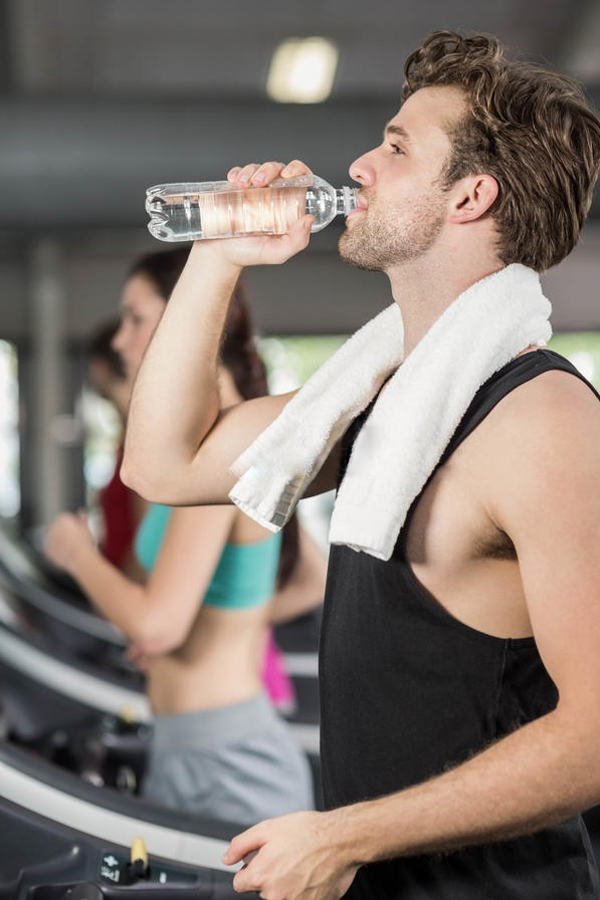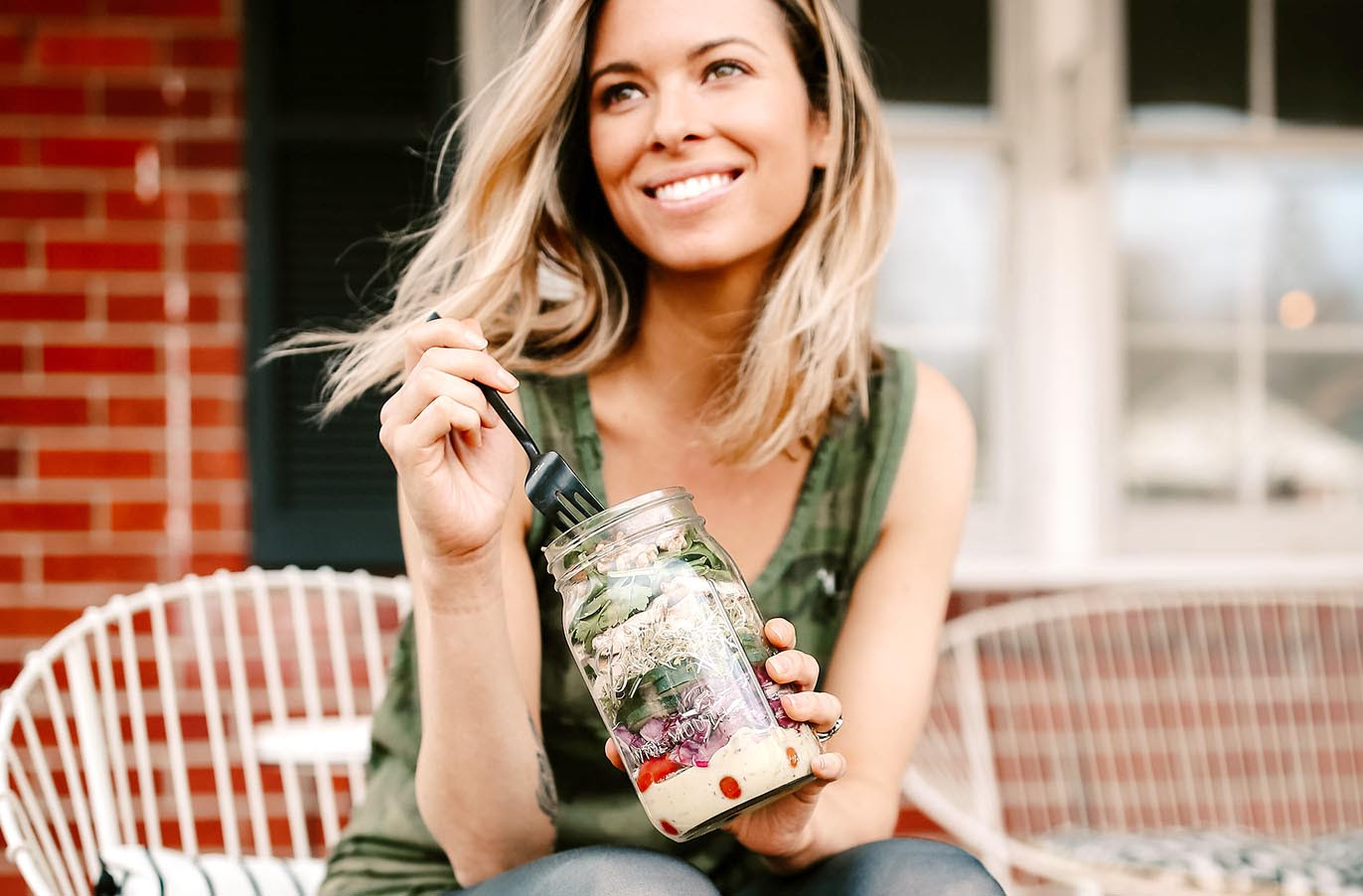5 Simple Ways to Jump-Start Your Nutrition Plan

You’re probably reading this because you’re hoping for some magic beans.
You know, the ones that solve all your health and nutrition needs. They taste delicious and cause you no discomfort or inconvenience whatsoever!
We all want them.
But they don’t actually exist.
So do the next best thing: build healthy habits. As we say: get 1% better every day. Make a small change every day to build a sustainable path to success.


You already know working out is essential for improving your fitness and overall health, but you can’t overlook your nutrition plan. The food you eat has a tremendous impact on every aspect of your life, from your mood to your energy levels to your mental clarity.
Oh, and physical performance. If you want to see the best results from your workouts, the way you fuel your body is the foundation of your progress.
Diets are hard. That’s why we don’t recommend them.
Not that we shy away from challenges. But we do shy away from “diets”.
Instead, we suggest building sustainable, healthy eating habits with the goal of consuming an organic diet high in protein, healthy fats, lots of vegetables, and an appropriate amount of carbs to set the stage for optimal performance in training and in life.
Make it as easy as possible by starting small. Here are five ways jumpstart your nutrition plan.
1) Drink More Water
You can actually start getting dehydrated before you realize it. If you’re thirsty, you’re probably already there.
It’s pretty simple to figure out if you’re drinking enough water: Mayo Clinic says that as long as you rarely get thirsty and if your urine is clear or pale, you’re in good shape, water-wise.
Make it a habit to sip on water throughout the day. Drink a glass as soon as you wake up, drink a glass before every meal, and keep that water bottle handy. If you’re used to drinking flavored beverages (many of which are probably pretty rich in sugar), try subtly flavoring your water by infusing fruits, mint, cucumbers, or some combination.
Hey, look, added bonus: sometimes when we think we’re hungry, we’re actually thirsty. We eat when we should be drinking water.
Hello, unnecessary calories.
If you keep a handle on that thirst by staying hydrated throughout the day, you reduce your chances of mixing up your body’s signals, and you avoid those extra calories. A well-hydrated body simply does everything better, from digesting food to working out to sleeping well–and when you sleep well, you’re energized and ready to tackle whatever the day brings.
But can you drink too much water?
“Having too much water in your system in relation to sodium is called hyponatremia, and it’s not actually from too much water as much as it is from an imbalance between water and electrolytes.”
It’s possible, but Mayo Clinic reassures us that “…drinking too much water is rare in healthy adults who eat an average American diet.” It’s far more likely that you’re dehydrated rather than over-hydrated.
And there’s more.
Water content in muscle cells plays a critical role in muscle breakdown; it allows your body to perform better. Basically, you’re going to feel stronger and more energetic when you’re hydrated.


A dehydrated body is a drained body. Literally. And you’ll feel it. The NCAA Sports Science Institute says, “Performance declines with as little as 2 to 3 percent decrease in body weight from water (sweat) loss.” In addition to drinking water throughout the day, you should prepare for and recover from exercise by drinking the following amounts (considering that you lose 27-43 ounces of water during a workout):
- Before: 16 ounces two or three hours prior to exercise; eight ounces 15 minutes before exercise
- During: Two or three big gulps every 15 minutes
- After: 16-20 ounces for every pound of weight lost during the workout
So fill your glass. (With water. That should go without saying at this point.)
2) Pick a Healthy Breakfast
Breakfast has long been touted as the most important meal of the day.
Then some people tried to challenge that, and maybe you heard that you should skip it and do fasted cardio.
Nope.
Breakfast continues to shine as the meal of champions in your nutrition plan, with studies showing all sorts of positive outcomes. These outcomes range from breakfast-eating children who are less likely to be overweight or have behavioral problems to breakfast-eating adults who are less likely to have coronary heart disease.
This is the one meal you can control every day. You won’t get derailed by work demands or a friend who insists on meeting for pizza. You can prepare it the night before by arranging the proper amounts of smoothie ingredients or making overnight oats in a trendy mason jar. Eggs take about two minutes, which is manageable even if you wake up late.


There are a billion food bloggers who have ideas on how to make breakfast as effortless as possible. We’ll share our ideas with you, too. Let us help you. Eat your breakfast.
3) Find a Healthy Snack You Like and Take It Everywhere
Look, we all get hungry between meals.
Instead of pretending that’s not you, get ready for it. Don’t put yourself in a position where you have no choice but to visit the vending machine or go through a drive-through.
(Unless you know about a vegetable drive-through that I don’t.)
Explore simple, healthy snacks until you find one you really enjoy. Apples and almond butter. Carrots and hummus. Cottage cheese and pineapple. Plain yogurt with nuts and dried fruit. These options are easy to prepare, easy to put in your bag (as long as they’re in an appropriate container), and easy to eat. Thye’re a solid part of any nutrition plan.
4) Watch Your Alcohol Consumption
Let’s lay down some alcohol math:
A regular beer has about 153 calories. Red wine has 125. A piña colada, for you oceanside drinkers, has 490.


There are 3,500 calories in a pound of fat. If you’re trying to lose a pound per week, you need to burn 500 more calories every day than you consume. You can see how a couple of glasses of wine at dinner each night (which, let’s be honest, we probably poured a little on the heavy side) can derail that effort and work against your nutrition plan.
Alcohol works against your healthy efforts in other ways, too.
Though you may have had the experience of getting sleepy after a couple of glasses of wine, alcohol is actually disruptive to your sleep. And your fitness levels?
“Alcohol use is directly linked to the rate of injury sustained in sport events and appears to evoke detrimental effects on exercise performance capacity. The model of alcohol consumption in human experimental studies has either been acute (single dose) or chronic (repeated doses over a period). These studies suggested that alcohol consumption decreases the use of glucose and amino acids by skeletal muscles, adversely affects energy supply and impairs the metabolic process during exercise.”
We’re not suggesting that you skip every happy hour from now until forever.
I love wine, too.
But when you know better, you can do better.
If you’re motivated to quit cold turkey, feel free. Otherwise, try this:
Establish your personal alcohol baseline by counting the drinks you have this week. (For example, each shot, 12-ounce beer, and six-ounce glass of wine.) Be honest. No one knows but you.
Next week, try to reduce your total by one.
Do the same thing the week after. And so on.
5) Don’t Eat After 7:00pm
Calories are calories, right? So who cares when we consume them?
I don’t know about you, but my post-7:00pm food choices aren’t usually the healthiest ones.
We often end up consuming a lot of empty calories if we mindlessly snack while we wind down for the evening.
Plus there’s this: intermittent fasting.
There are a couple of different methods. One involves reducing calories a couple of days each week, and the other involves eating within an eight-hour window each day. Cutting off your caloric intake as early as possible gives you more hours between your last meal of this day and your first meal of the next.
Science shows benefits ranging from a decreased risk of diseases like Alzheimer’s and lower rates of depression. Of course, you should talk to your doctor before making a drastic change to your diet, and learn more about the pros and cons of intermittent fasting before you begin.
Very few of us can turn our entire lives around in one day, but we all can make an effort to be 1% better every day. That starts with small changes to your nutrition plan that add up to big results.







